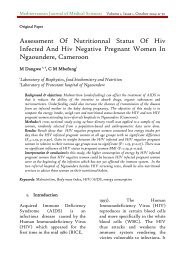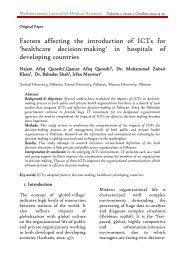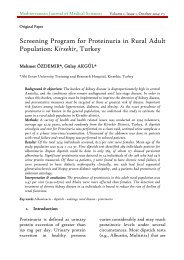Mediterranean Journal of Medical Sciences MJMS
Mediterranean Journal of Medical Sciences,aims to provide a platform for knowledge sharing among academicians, students, researchers, physicians, government entities and other non government entities. Issues : 3 per year ISSN 2385-2712 EISSN 2385-2453 http://mcmscience.org/
Mediterranean Journal of Medical Sciences,aims to provide a platform for knowledge sharing among academicians, students, researchers, physicians, government entities and other non government entities.
Issues : 3 per year
ISSN 2385-2712 EISSN 2385-2453
http://mcmscience.org/
You also want an ePaper? Increase the reach of your titles
YUMPU automatically turns print PDFs into web optimized ePapers that Google loves.
<strong>Mediterranean</strong> <strong>Journal</strong> <strong>of</strong> <strong>Medical</strong> <strong>Sciences</strong> Volume 1, Issue 1, October 2014: 31-52<br />
Original Paper<br />
Issues and Prospects <strong>of</strong> e-health in Pakistan<br />
Qamar Afaq Qureshi 1 , Najam Afaq Qureshi 2 , , Dr. Muhammad Zubair<br />
Khan 2 , Dr. Allah Nawaz 1 Dr. Bahadar Shah 3 ,<br />
1 Gomal University, Pakistan 2 Sarhad University, Pakistan, , 3 Hazara University, Pakistan<br />
Abstract<br />
Background & objectives: In connection with access to information in developing countries,<br />
information flows through existing networks <strong>of</strong> communication is a main theme in the current<br />
IS literature .<br />
Methods:Information-intensive infrastructure is a requirement for information dissemination<br />
due to the shortage <strong>of</strong> network infrastructure in the majority <strong>of</strong> developing states. It is<br />
verified by many researchers that information managing technologies with their main purpose<br />
<strong>of</strong> ‘handling information’ have the advantage to enhance already existing technologies by<br />
making better information-communication a priori to new ICT innovations .Presently health<br />
information system infrastructure is deficient in resources to meet the demands and needs <strong>of</strong><br />
increasing population in developing countries. Health care systems <strong>of</strong> developing countries<br />
have major barriers like poverty and lack <strong>of</strong> technological sophistication.<br />
Results:The basic difficulties or barriers in using information technologies include poor or<br />
inadequate infrastructure, insufficient access to the hardware and inadequate or poor<br />
resources allocation. By eliminating these barriers population health status can be improved in<br />
developing countries.<br />
Interpretation & conclusion: This study aims to determine the main issues and prospects for e-<br />
health in the current situation <strong>of</strong> developing countries like Pakistan and the way forward for<br />
policy makers to manage all issues in future for more effective and rational decision-making<br />
in healthcare organizations.<br />
Key words: e-health; challenges; prospects; developing countries; Pakistan<br />
1. Introduction<br />
E–health is a latest platform for<br />
handling many healthcare issues.<br />
E-health systems have presented<br />
so many gadgets which are being<br />
used by both developed and<br />
developing states. Healthcare<br />
related IS and hardware is now<br />
inexpensively obtainable all over<br />
the world. On the other hand<br />
successful adoption and use <strong>of</strong> e-<br />
health systems depends on the<br />
suitable infrastructure (Khoja et<br />
al., 2012). The readiness and<br />
awareness <strong>of</strong> doctors and<br />
physicians about the usage <strong>of</strong> ITapplications<br />
in hospitals can be








